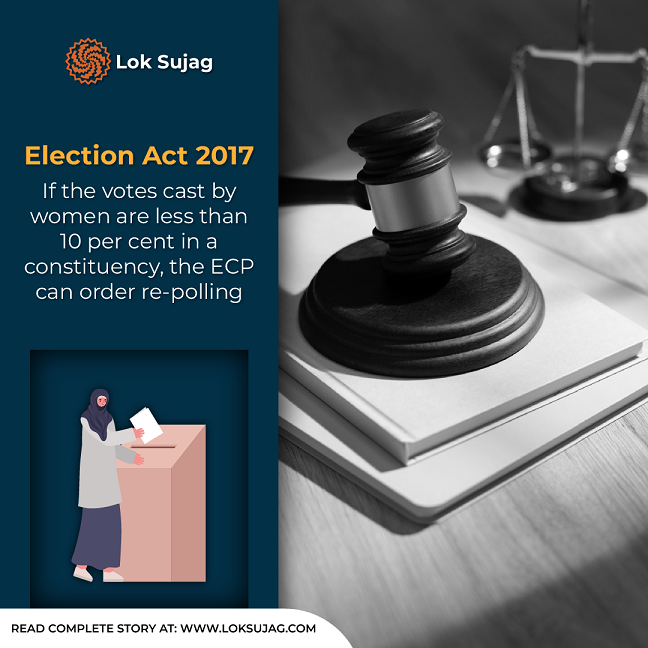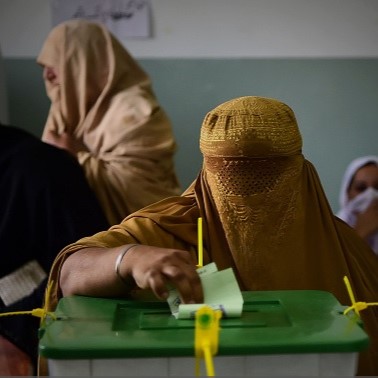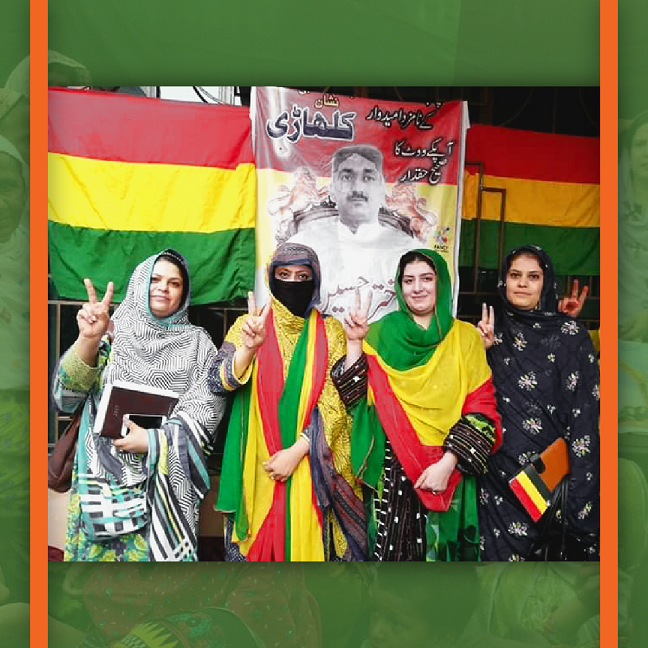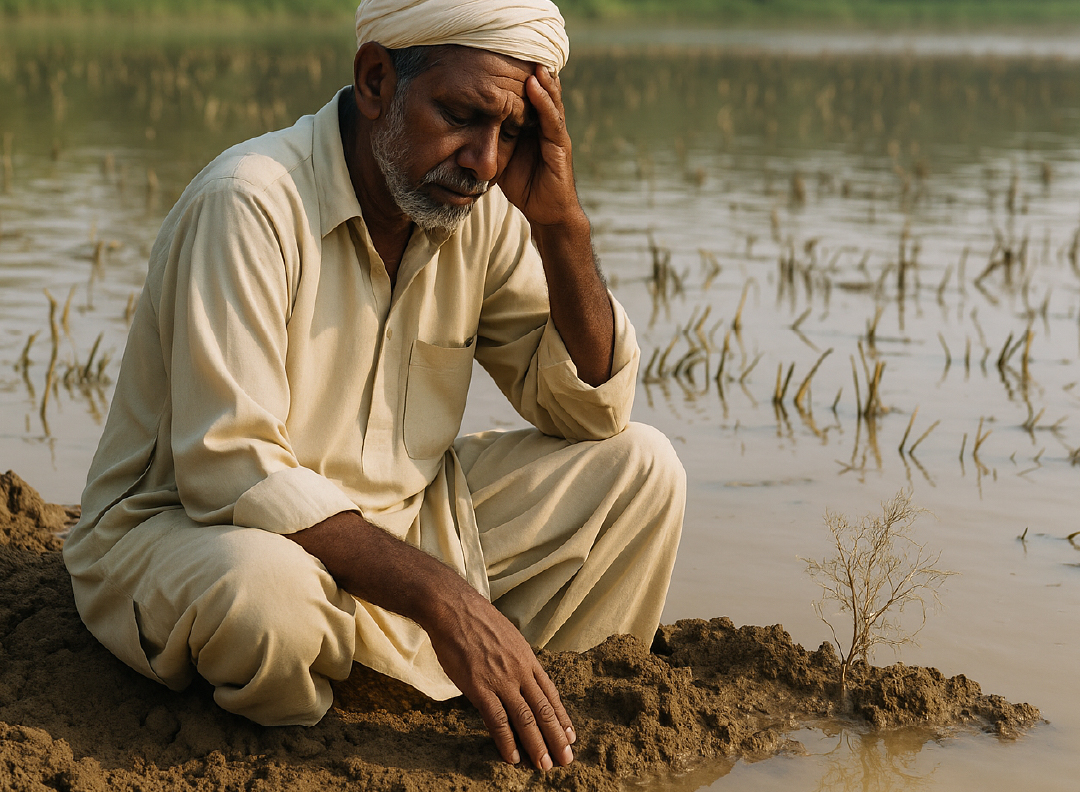Bibi Zarsanga is a resident of the village Spina Teja in Qilla Abdullah district. She is 30 years old but has never cast a vote.
She says her identity card was not made, so she could not vote. The other women in her household have also not exercised their right to vote, as only men vote here.
Zarsanga has studied up to the fifth standard. She says she could not study further because no middle school for girls in her area exists. When one is not educated enough, one doesn’t understand the importance of having an ID card or voting.
“Five years ago, I got married to my cousin. My husband's ID card just got expired, so I got one made for myself along with him. I want to vote in the election, but my husband may not allow me. If he allows me, I will be the first woman in this family to vote."

According to the Election Commission of Pakistan (ECP), the number of women voters registered in Balochistan in 2018 was 18 lakh 13 thousand 562. At that time, only seven lakh 14 thousand and 914 women had exercised their right to vote, which is 37.64 per cent of the registered women voters.
According to the non-governmental organisation Free and Fair Election Network (FAFEN), in the last elections, the lowest turnout of women in this province was seen in the NA-266 constituency of Quetta district, where the rate was around 25 per cent.
In two national constituencies of the province, women's turnout was less than 30 per cent, while in seven constituencies, the rate was between 31 and 40 per cent. Women cast the highest number of votes in NA-268 Chagai cum Noshki cum Kharan where their turnout was around 57 per cent.
Among the two lakh 32 thousand 613 registered voters in Qilla Abdullah, there were 83 thousand 891 women voters, out of which only 31 thousand 474 women voted, which were 37 per cent of the registered women voters.

Caretaker Provincial Adviser for Women Development Shania Khan says that the continuous campaign for women's participation in the political process has seen a positive response. In this regard, women in Balochistan are advancing in the political field despite all the obstacles.
The data of the ECP shows that the number of women voters registered in the province in 2018 was 18 lakh 13 thousand 562, whose number has now increased to 23 lakh 55 thousand 783. Thus, during five years, women voters in the province have increased by five lakh 42 thousand 221, which is more than 43 per cent of the total voters.
The caretaker provincial adviser believes that compared to other provinces, the women of Balochistan have struggled a lot in the disturbing situation of law and order. Due to these women being at the forefront of the political process, a large number of women will now vote.

According to the new statistics of the Election Commission, there are a total of One lakh sixty-three thousand and 753 registered voters in Qilla Abdullah district, including one lakh four thousand 161 male and 59 thousand and 592 female voters, which constitute only 36 per cent of the registered voters.
According to the ECP, in 2018, there were two lakh 32 thousand 613 registered voters in NA-263 Qilla Abdullah/Chaman. There are three lakh 57 thousand 834 voters in the current NA-266. Out of them, hundreds of women like Zarsanga hope to exercise their right to vote in the upcoming elections.
The Pashtunkhwa Milli Awami Party’s (PMAP) Provincial Information Secretary Nasir Nangyal says that voting is the national duty of every male and female voter.
“Although separate polling stations are set up for women in most places, in sparsely populated areas, a joint polling station is created with a curtain arranged for privacy.”

He says that political parties, including PMAP and Jamiat Ulema-e-Islam (JUI), have expressed their determination that women should vote like men without facing problems.
In a report by Human Rights Watch on the voter gender gap in Pakistan, the main reason for the low registration of women voters is their lack of computerised identity cards.
According to the report, backwardness and lack of education play a major role in the main reasons for the lack of identity cards. As a result, these women cannot only not avail their right to vote but also benefit from programs such as the Benazir Income Support Program.
Alauddin Khilji, regional director of Aurat Foundation in Quetta, says that his organisation has worked in 25 districts of the country under the 'Jazba Program'.
Consequently, more than two and a half lakh women's identity cards have been made, and their votes have been registered.
He says everyone needs to work together to include women in the political process.
Also Read

Struggle for inclusive voting in Shangla ahead of general elections
The Election Laws (Election Act 2017) empower the ECP to order re-polling in a constituency if less than 10 per cent of women's votes are cast.
The Election Act prohibits any agreement to prevent women from voting or any interference with the voting process.
An officer of the ECP said on condition of anonymity that hundreds of women's identity cards had been made through mobile vans with the support of NADRA. Apart from this, awareness campaigns were conducted in various areas, especially educational institutions, but there were no significant results.
During awareness sessions, young, educated girls are often asked why they don't have an identity card. They reply that their household believes they should get one in their husband's name after marriage.
He expressed that to improve the turnout of women, parents need to be informed about the importance of voting. Second, political parties should provide transport to bring women to polling stations. However, the appointment of polling stations and women staff is the responsibility of the ECP.
Balochistan National Party's Shumaila Ismail says that her political party makes every effort to reach out to women and arrange transport to bring them to the polling stations. But there will be no change until women come out for campaigning.
Published on 19 Jan 2024



















